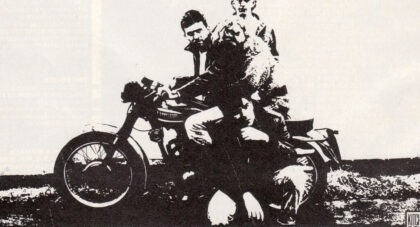Unknown Mortal Orchestra's fourth full-length, Sex & Food is both reflection and rumination on our times. Simultaneously grandiose and deeply contemplative, the record swirls with disparate sounds and themes - unified by a pessimism and fear of where we're headed and how we got there. We reached the band's leader, Ruban Nielson, by phone while he made coffee at home. Nielson opened up about his own self-doubt in the creative process, how pop music is one of the greatest currents in his life, and the unlikely role Salvador Dali played in one of the records key moments.
Aquarium Drunkard: Sex & Food has been out now for nearly a month - has there been a pleasant or surprising element of the reaction to it that you've seen? Is there something that really sticks out to you in the way people are perceiving it?
Ruban Nielson: The first thing that comes to mind is when we recorded the base tracks for a song called "Hunnybee," it was Jake Portrait, the bass player in the band, my brother Kody, who plays drums, and I. We were at my brother's place and I showed them the song and we were just playing through it. We kind of had this idea that it would maybe be the song of the album - the biggest or best song. We'd only been recording for half an hour and we thought, "let's move on to something else cause I think we just made something good." And every time we worked on that song we always thought, "don't screw it up, don't screw up what we got on that first day." It's not a single on the record or anything, yet, but it already seems to be the one that people are reacting to the most. It's kind of interesting when people respond the way that your own instincts tell you.
AD: What was it about the songs you've selected as singles so far, starting with "American Guilt,” that made you want those to be the first that people would hear?
Ruban Nielson: Well, the way the singles are chosen, I'm not sure how everyone else on my label is, but we have a lot of fun with that stuff. We had a lot of debates and conversations about how to introduce people to the record. I think the main tension is that the record is not built to endear itself to the listener on the first listen - which makes for a scary round of reviews. We know that it doesn't really open up until the third listen or so. And it's kind of something that I'm always dealing with; that when I'm making the record I'm actually purposefully moving away from things that will make the music immediately appealing. So when we're choosing the singles, I think "American Guilt" was chosen first [because] they thought the song was strong, but I think the reason to put it out first was almost to confuse people and start a conversation, because it seemed to be the only real... it was kind of for fun, really. But it is a strategy - I just didn't want to put out the song that would be the most appealing. And actually, on the last record, Multi-Love, the single [of the same name], when we put that song out we chose it because we thought it would be a shock and we didn't really know what was going to be the biggest song on the record. We kind of thought it was going to be too weird, ultimately. So after that, having gone with the song that we thought would be the most exciting on that album, we thought, maybe we should exaggerate, put the two most confusing songs out as singles first [for this one]. I don't think there ever really was going to be one song that could represent the record, so maybe we could just confuse everyone until the record came out.
Only the good shit. Aquarium Drunkard is powered by its patrons. Keep the servers humming and help us continue doing it by pledging your support.
To continue reading, become a member or log in.


